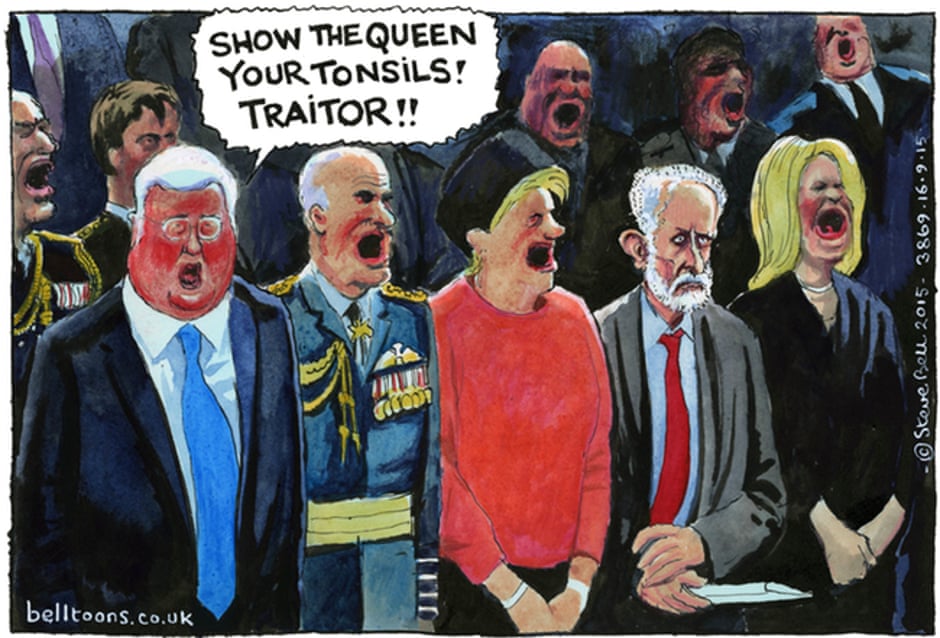 |
| Image: PBS |
I've been slightly grumpy for the past few days. There are a number of good reasons why I might be feeling grumpy (the OU for which I work is still in a pickle, I was recently knocked back for something I thought was right for me, and the UK is in the midst of a wholly unnecessary referendum which could have dreadful consequences). But actually that's not why I'm grumpy.
It's because, bizarrely, a woman I've never met is celebrating her 90th birthday. In a sense, good luck to anyone who gets that far in life, but this particular woman is the head of state of the country where I live, and too many people are making too much of a fuss of her birthday.
The media's interest is unsurprising. I know why the BBC would make a fuss - they're establishment to their core, and always milk the royal occasions (plus they want not to be eviscerated by the Tories and just might manage it this time). And much of the rest of the media is solidly rightwing anyway. Plus all of them like good copy.
But it's other civic institutions that bother me and have been making me grumpy. A depressing number of churches, even the supposed non-conformist ones (including my own local church) are holding special Liz-is-90 services complete with flags and national anthems. Even schools are getting into it - my kids' (excellent) school had pupils dressed in red, white & blue this week, and by accounts I read they weren't alone.
So what does this mean, apart from a rise in my grumpy-old-git quota? The Guardian has an incisive article by Dawn Foster which refers to a 'pernicious new patriotism' - she especially refers to street parties of which I've not seen much evidence (and a lot less than the Queen's diamond jubilee) but I think her analysis is quite right.
Perhaps we might call this civic nationalism, a phrase used to good effect by the pro-independence camp in the Scottish referendum. There the phrase referred to a nationalism based on committment to a place of residence rather than to ethnic background. More generally, the phrase is said to refer to a nationalism compatible with liberal values, inclusion and tolerance. But I think it's only a slight stretch to suggest that it also refers to the kind of soft nationalism that we're seeing around the Queen's birthday celebrations.
There's an attempt to be inclusive, to draw the nation together around a supposed shared love for the monarch. We all know the monarchy is politically weak (though their wider influence remains strong and they sit at the top of a pyramid of deference and power), and they have little power to command the people to love them. It's quite a different story from the huge portraits of supposedy-beloved leaders found in undemocratic states in various places. So it has to be voluntary. But it's partial. It excludes republicans. It excludes those who disagree with the current political structures of the UK (such as Scottish, Welsh or Irish nationalists). Despite the civic tag, it risks excluding those born outside these isles.
And that's where the uglier sort of nationalism sits behind this kind. Nobody is forcing anybody to participate. For most people, it's easy enough to exclude yourself from the events celebrating the royal birthday, or to stay silent when the national anthem is sung, or equivalent acts. But you still risk being excluded from the wider group, whether you seek that or not. You risk being called a killjoy or grump. Those who live their lives in edgier sub-cultures within the UK than I do might risk more. Those who want to participate in public life put it at risk, at Jeremy Corbyn discovered when he refused to sing the national anthem last year.
 |
| Image: Steve Bell cartoon, The Guardian |
The further risk is of political manipulation. As I write, the country is 12 days from a referendum on leaving the European Union. It's a hugely heightened time for issues of nationalism, of any sort. So far the current events haven't been exploited by the Leave campaign, but it may yet come - or may yet make a difference.
Nationalism is not always evil, but it is often dangerous. We're experiencing at least some form of it with the Queen's birthday celebrations, and it's playing with fire. That's why I'm grumpy.



No comments:
Post a Comment